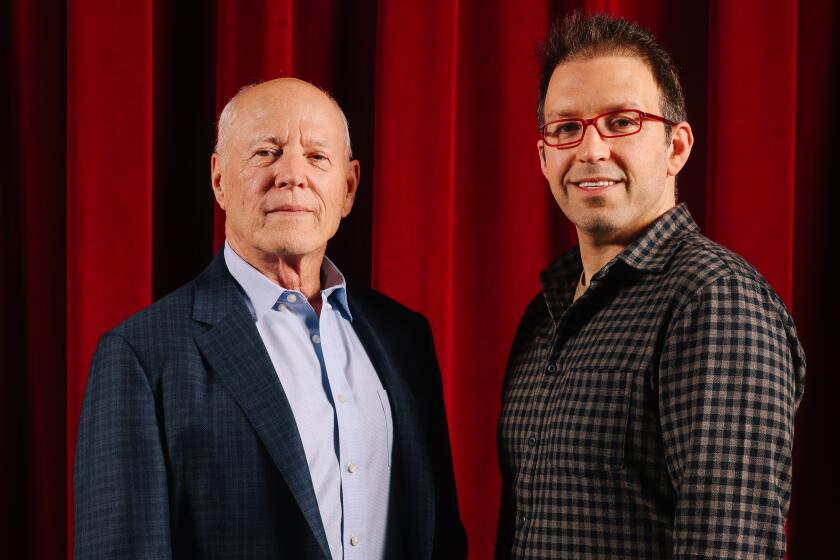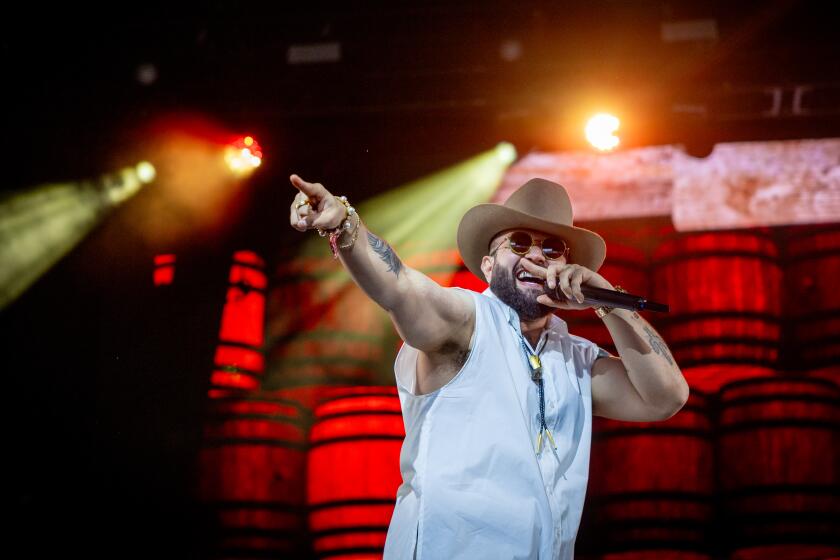$11.3-Billion Univision Bid Is Accepted
The board of Univision Communications Inc., the nation’s largest Spanish-language media company, voted late Monday to accept an $11.3-billion offer for the company from a group of investors including billionaire media mogul Haim Saban, according to three sources close to the board.
The two sides were still working out the details of the agreement Monday.
Univision and Saban declined to comment.
A breakthrough in the tumultuous auction for Los Angeles-based Univision came over the weekend when Saban’s group, led by private equity firms Texas Pacific Group and Thomas H. Lee Partners, raised its bid to $36.25 a share. The group had initially entered a $35.50-a-share bid last week, but Chairman A. Jerrold Perenchio deemed it too low.
However, a challenge could still come from the other bidder, a group led by Mexican broadcasting giant Grupo Televisa. That team had submitted a bid of $35.75 a share -- which it believed was the highest offer -- after a chaotic week that saw the departure of several of its private equity bidding partners in a dispute over price.
At Monday’s meeting, two members of the Univision board voted against the Saban group. Those seats are controlled by Televisa and Venezuela’s Venevision media conglomerate.
The Televisa group had been prepared to raise its initial offer. But the group didn’t hear from Perenchio for three days and didn’t learn of the higher bid until the Univision board meeting, held in Univision’s corporate suite in Century City, according to a member of the team.
Perenchio has long been known as a hard-nosed negotiator. One of his business tenets, which he calls the “rules of the road,” is: “Take options, never give them.”
Saban’s group also includes Providence Equity Partners and Madison Dearborn Partners. The private equity partners each put up nearly $1 billion and Saban contributed about $250 million, according to a source close to the negotiations. The group also would assume $1.4 billion in Univision debt.
Saban, who made his fortune on the Mighty Morphin’ Power Ranger cartoons, has had his eye on Univision since 2001, when he made about $1.5 billion in the sale of the Fox Family cable channel to Walt Disney Co.
A year ago, Saban paid Perenchio a visit in his offices and asked to buy Univision. But Perenchio, who has run Univision since 1992, told Saban his company was not for sale.
Perenchio, 75, decided in February to put Univision on the block. He figured he had expanded the company to a $2-billion-a-year revenue generator but wanted to give new owners more than a decade to reap returns on their investment before the expiration of a programming agreement with Televisa, which supplies the wildly successful telenovelas that drive Univision’s enormous ratings.
Monday night’s board vote revealed just how much animosity exists between Perenchio and Emilio Azcarraga Jean, the chairman of Televisa. Azcarraga had long sought to have a greater say in the management of Univision, which his grandfather started 45 years ago. But Perenchio spurned his attempts.
In 1992, it was Azcarraga’s father who joined Perenchio and Venezuelan media magnate Gustavo Cisneros, who controls Venevision, to acquire Univision from Hallmark Cards Inc. for $550 million. Each of the three partners chipped in $33 million of his own money. But because Perenchio was the only U.S. citizen, he won control of the company.
U.S. laws prohibit foreign citizens from owning more than 25% of a broadcasting company. That restriction hobbled Televisa’s bid.
Univision board members ultimately decided to go with the Saban group’s bid, figuring it would have an easier time winning regulatory approval since its members were all U.S.-based firms, a source close to the board said.
Televisa was joined in its bid by Microsoft Chairman Bill Gates’ Cascade Investment and the Boston-based private equity firm Bain Capital.
Univision shareholders must approve the purchase, which is expected to close next year after clearing regulatory hurdles.
At issue could be Saban’s ability to work with Televisa, which provides its programming to Univision in the exclusive deal that doesn’t expire until the end of 2017. Televisa has long chafed under that ironclad agreement, because it pays Televisa royalties of 9% of the ad revenue -- even though Televisa programming brings in 40% of Univision’s revenue.
Another fight probably will be waged over the rights to use the Televisa telenovelas on the Internet and other new media platforms. The two sides have tabled a disagreement over who has digital rights to that content until the end of this year. Next year Univision will also lose the U.S. broadcasting rights to Televisa’s Mexican soccer matches.
Many analysts figured that teaming up with Televisa would be the way to win Univision, a view not shared by Saban.
A native of Egypt, Saban immigrated at age 12 to Israel, where he attended agricultural school and served in the Israeli Defense Forces. He moved to Los Angeles in 1983.
In Los Angeles, he launched a chain of recording studios that supplied music for television. Saban’s venture into television began in 1988, when he formed Saban Entertainment.
The company produced a number of hits, including “The X-Men” and other shows developed around Marvel Comics characters.
More to Read
The biggest entertainment stories
Get our big stories about Hollywood, film, television, music, arts, culture and more right in your inbox as soon as they publish.
You may occasionally receive promotional content from the Los Angeles Times.






